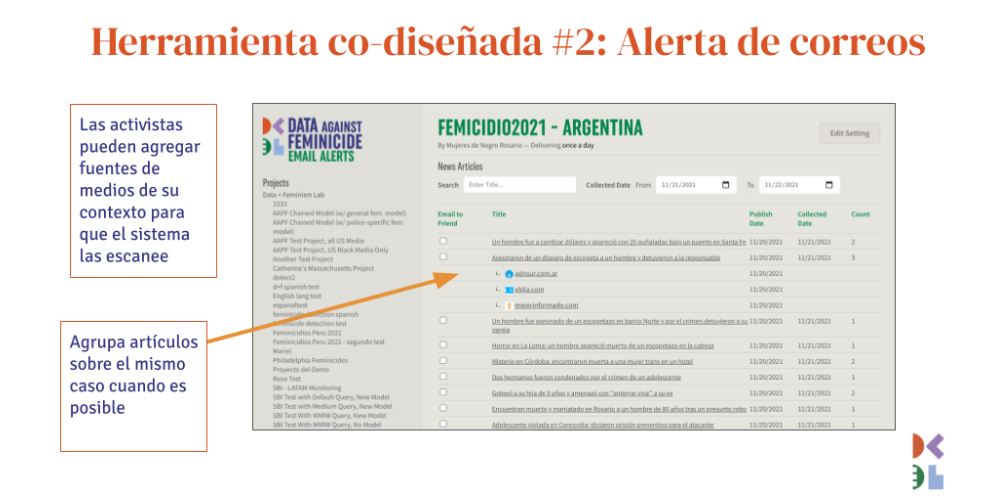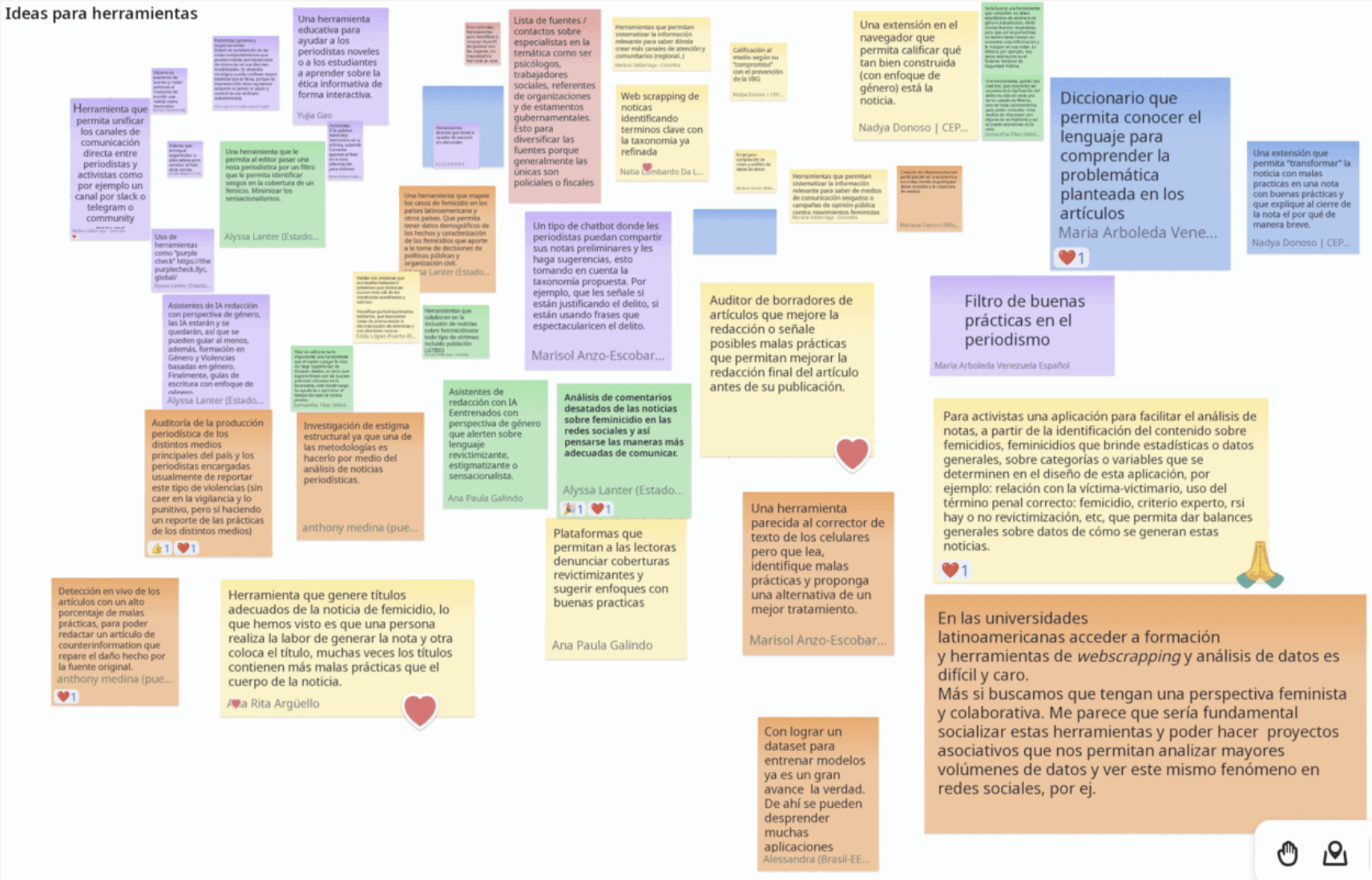Feminicide and gender-related murders are serious problems worldwide, and official data on these crimes are often incomplete, difficult to access, not updated frequently, and subject to controversy: they are missing data. For this reason, activists and civil society organizations play a vital role in producing counterdata on feminicide.
Feminicide counterdata refers to the production of alternative data by activists and organizations. It involves investigating, recording, and remembering cases of feminicide and gender-based violence that are often overlooked or underestimated by official sources and the media.
Activists use alternative epistemological approaches to data science that focus on care, memory, and justice. They employ various methods and technological tools, such as internet searches, email alerts, monitoring media and other sources, and tracking the status of cases over time. In this effort, activists face significant challenges in retrieving and extracting information, which increases their monitoring work and emotional burden.
Counterdata is a way for activists to challenge dominant narratives and data collection practices, making victims more visible and promoting collective action. It is a form of data activism that addresses the missing and flawed data surrounding these issues, and aims to recover the lives and stories of victims, provide a more comprehensive understanding of the structural nature of this violence, promote collective action, and advocate for justice and human rights.
Publications
-
Data Activism Against Feminicide (Cruxên & Jungs de Almeida, 2024)
What role does data play in addressing gender-based violence? This report summarizes the results of five years of collective work as part of the Data Against Feminicide project. Data Against Feminicide is a South-North participatory action research and design project that supports the work of activists and civil society organizations that produce data on gender-based
-
Counting Feminicide: Data Feminism in Action (D’Ignazio, 2024)
What isn’t counted doesn’t count. And dominant institutions systematically fail to account for feminicide, the gender-based murder of women and girls, including cisgender and transgender women. In the face of this failure, Counting Feminicide foregrounds the work of data activists across the Americas who are documenting these kinds of murders and challenging the reigning logic
-
Data Against Feminicide: The Process and Impact of Codesigning Digital Research Tools (Suárez Val et al, 2024)
Data Against Feminicide is an action research collaboration that aims to foster an international community of practice around femicide data. In this chapter, we introduce two tools we have co-designed and tested with activists to facilitate their work and ease the burdens on their workflow. Data Against Feminicide Email Alerts is an artificial intelligence-based system that detects
-
Challenging (in)security: Missing Data and Counterdata Production on Feminicides in the Americas (Jungs de Almeida et al, forthcoming)
Jungs de Almeida, A., Cruxên, I., Radhakrishnan, R., & D’Ignazio, C. (forthcoming). Challenging (in)security: Missing Data and Counterdata Production on Feminicides in the Americas. En P. Anctil (Ed.), Feminist Security Studies in the Americas: Pushing the Fronteras. Palgrave Macmillan. Enlace externo
-
The revolution shall not be automated: On the political possibilities of activism through data & AI (Cruxên, 2024)
Reflecting on the “AI revolution”, Isadora Cruxên draws on her experience working with activists in the collaborative project Data Against Feminicide to argue that the politics of data and AI is, at heart, a politics of knowledge production. She invites us all to take part in this conversation. Cruxên, I. (2024, mayo 28). The revolution
-
Technology and Anti-Feminicide Data Activists (Jungs de Almeida et al, 2023)
Data Against Feminicide project collaborates with Brazilian civil society organizations to develop digital technologies to support the struggle against feminicide. Jungs de Almeida, A., D’Ignazio, C., França, C., Cruxên, I., Kalil, M. E. X., Marques, R., Mariano, S., Negrão, T., & Siqueira, T. P. (2023, agosto 30). Tecnologia e Ativistas de Dados Contra o Feminicídio.
-
Human-Centered Computing and Feminicide Counterdata Science (D’Ignazio, 2023)
Data about feminicide can be conceived as missing data – data that are neglected by authorities and underreported in official registries. Activists and civil society groups in Latin America and beyond are increasingly stepping into these gendered data gaps to undertake feminist counterdata science – an explicit challenge to the inadequate data practices of governments
-
Feminicide Data Activism (Collectif Féminicides Par Compagnons ou Ex at al, 2023)
This chapter weaves together, as nodes in a network of care, the experiences of activists collecting feminicide data in France, Germany, Kenya, Kyrgyzstan, Mexico, Russia, the United States, and Venezuela. In our work, we draw from a long genealogy of feminist research and activism on femicide/feminicide and gender-related violence. To contextualise our practices, we draw
-
Feminicide and counterdata production. A conversation with FAIR
Feminicide and counterdata production. A conversation between the DCF team and the Feminist AI Research Network (FAIR). ILDA, Data + Feminism Lab, Feminicidio Uruguay, Tierra Común, & Feminista AI Research Network (Producers). (2022, agosto 9). Feminicidio y la producción de contradatos [Video recording]. https://www.youtube.com/watch?v=Nhu8mBoBvXs
-
Feminicide data, emotional labor and self-care (Suárez Val et al, 2022)
Producing feminicide data has historically been an important feminist tactic to make gender-related violence visible and to draw attention to the lack of data from official sources. María Puig de la Bellacasa says, in relation to the production of knowledge, that “care” implies simultaneously the work of daily maintenance, an ethico-political commitment and the affective
-
Towards Intersectional Feminist and Participatory ML: A Case Study in Supporting Feminicide Counterdata Collection (Suresh et al, 2022)
Data ethics and fairness have emerged as important areas of research in recent years. However, much work in this area focuses on retroactively auditing and “mitigating bias” in existing, potentially flawed systems, without interrogating the deeper structural inequalities underlying them. There are not yet examples of how to apply feminist and participatory methodologies from the
-
News as Data for Activists: a case study in feminicide counterdata production (Bhargava et al, 2022)
Bhargava, R., Suresh, H., & Doğan, A. L. (2022). News as Data for Activists: A case study in feminicide counterdata production. 5. https://github.com/browninstitute/c-plus-j-website/raw/main/proceedings/Session9Group2.pdf News articles are an important source of data for recording and aggregating a range of social phenomena. In this paper, we ask if and how technology can support civil society activists who
-
Affect Amplifiers: Feminist Activists and Digital Cartographies of Feminicide (Suárez Val, 2021)
Feminicide, the gender-related violent deaths of women, is the tip of the iceberg in a continuum of violence that is “terrorizing women” in the Americas (Fregoso and Bejarano 2010)1 . As well as street protests, performances, hashtag campaigns and many other online and offline actions, feminist activists across Latin America have been denouncing feminicide by
-
Data against Feminicide (Fumega, 2021)
Data is not the solution to the problem but without the right data, without giving visibility to the “missing data”, it is impossible to understand and to think about solutions. Fumega, S. (2021). Data against Feminicide. Feminist AI. https://feministai.pubpub.org/pub/data-against-feminicide/release/1 Enlace externo
-
Feminicide & Machine learning: Detecting Gender-based Violence to Strengthen Civil Sector Activism (D’Ignazio et al, 2020)
Gender-related violence against women and its lethal outcome, feminicide, are a serious problem in Latin America and the Caribbean (LAC), as they are in the rest of the world. Although governments have passed legislation criminalizing feminicide, these laws have not been accompanied by relevant policy nor by robust data collection that measures the scope and
-
Monitoring, recording, and mapping feminicide – experiences from Mexico and Uruguay (Madrigal et al, 2019)
In this article, four researchers and activists – mappers of feminicide in Ciudad Juarez, the State of Mexico, Mexico, and Uruguay – present, in our own voices, our diverse personal and embodied experiences of monitoring, recording, and mapping cases of feminicide. Our objective is to reflect on the practices of creating these imperfect tools of
Community events
November 2021: Technology in action
This discussion, in a conversation format, allowed various civil society organizations to share their experiences and work with femicide data . The participants were organizations that participated in the development of the DCF tools. The challenge was: Can algorithms help in the fight against feminicide?

Tools

Co-designed Tool #1
Data Highlighter
The Data Against Feminicide Highlighter is a plug-in for the Chrome browser. Its function is to highlight words in the text of a web page that are useful for recording cases, specifically names, places, dates, and words selected by the user. The plug-in also allows a database to be opened side-by-side (or top/bottom) simultaneously with the article being analyzed, to facilitate data entry. It also allows the article URL to be shared via email. It works in Spanish, English, and Portuguese and on any web page, but is optimized for news media websites.

Co-designed Tool #2
Email Alerts
The Data Against Feminicide Email Alerts combines a media database, a machine learning algorithm, and email alerts to report potential cases of feminicide. The system searches the MediaCloud database for news stories based on search terms and the region determined for each project. It then filters the results through a machine learning algorithm specifically trained to calculate the probability that an article refers to a case of feminicide and to group articles from different sources that refer to the same case. Finally, an email is sent out with the relevant articles, based on the frequency determined by each user. The MediaCloud system allows users to view the sources and also suggest new relevant sources.
If you or your group are interested in using Data Against Feminicide’s Email Alerts or in exploring a translation project, please send an email to datoscontrafeminicidio@gmail.com.

Feminicide Narratives and AI
We are currently collaborating with DISCO Lab, Brown University to explore the possibility of implementing a feminist process for the development of AI tools.
Find out more about this project.
